| There are a surprising amount of people claiming to be brethren in Christ who not only observe the appointed times God gave the Jews, but also attempt to teach Christians to do the same. I too was one of these people at one time, because I was deceived early on by some folks in the Messianic Jewish movement into thinking this was a practice Christians ought to be observing, but as I began to study the New Testament doctrine for myself, I discovered some very fascinating things that has led me to the understanding that many people who observe the traditions of the Old Testament are actually denying the Lord Jesus Christ. | 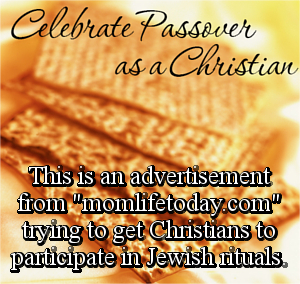 |
"Its[Passover's] celebration was a significant part of the biblical heritage upon which the early Jewish leaders of the Church had founded a faith and polity that recognized Yeshua (Jesus) as the fulfillment of the Messianic expectations of His People and as the Savior of the world."
-John D. Garr, "Should Non-Jewish Believers Celebrate the Passover?" Jewish Voice Ministries International, retrieved Mar 4, 2015, [jewishvoice.org/messianic-education/jewish-roots/feasts/should-non-jewish-believers-celebrate.html]
This is absolutely not true, as we will see in Scripture in just a moment. This man is actually making a statement about "Christians" who are accepted by a Jewish Council, but he refers to born-again Christians in terms of, and I quote, "ecclesiastical anti-Judaism."
I'm not saying that anyone who's ever observed Jewish tradition is going to hell. I get accused of such things all the time. I also had to take time to understand the truth about the matter, but we also need to face the reality that there are false converts out there who are teaching false doctrine because they don't have an understanding of New Testament Scripture.
I've received many letters from people on this subject, which is what convicted me to write about it in the first place, and those who defend their belief in celebrating Jewish traditions often quote from 1 Corinthians 5. Recently (from when this was first published), I had a lady write me about this chapter, but she only quoted from two fragments of two verses:
For even Christ our passover is sacrificed for us: Therefore let us keep the feast,
-1 Corinthians 5:7-8
Let's start in verse 1, and get the context so we can understand what's being said:
It is reported commonly that there is fornication among you, and such fornication as is not so much as named among the Gentiles, that one should have his father's wife.
-1 Corinthians 5:1
The nakedness of thy father, or the nakedness of thy mother, shalt thou not uncover: she is thy mother; thou shalt not uncover her nakedness.
-Leviticus 8:7
And ye are puffed up, and have not rather mourned, that he that hath done this deed might be taken away from among you.
-1 Corinthians 5:2
For I verily, as absent in body, but present in spirit, have judged already, as though I were present, concerning him that hath so done this deed,
-1 Corinthians 5:3
In the name of our Lord Jesus Christ, when ye are gathered together, and my spirit, with the power of our Lord Jesus Christ, To deliver such an one unto Satan for the destruction of the flesh, that the spirit may be saved in the day of the Lord Jesus.
-1 Corinthians 5:4-5
Moreover if thy brother shall trespass against thee, go and tell him his fault between thee and him alone: if he shall hear thee, thou hast gained thy brother. But if he will not hear thee, then take with thee one or two more, that in the mouth of two or three witnesses every word may be established. And if he shall neglect to hear them, tell it unto the church: but if he neglect to hear the church, let him be unto thee as an heathen man and a publican.
-Matthew 18:15-17
(Read "Is the One-Pastor Church System Biblical?" here at creationliberty.com for more details.)
There are many new-age church buildings out there leading huge numbers of people to hell under false, new-age pretenses, and they glory in themselves for their wicked practices and teachings.
Your glorying is not good. Know ye not that a little leaven leaveneth the whole lump?
-1 Corinthians 5:6
Purge out therefore the old leaven, that ye may be a new lump, as ye are unleavened. For even Christ our passover is sacrificed for us:
-1 Corinthians 5:7
Therefore let us keep the feast, not with old leaven, neither with the leaven of malice and wickedness; but with the unleavened bread of sincerity and truth.
-1 Corinthians 5:8
The disciples of Christ were confused on this issue at first, but then it was revealed to them.
And when his disciples were come to the other side, they had forgotten to take bread. Then Jesus said unto them, Take heed and beware of the leaven of the Pharisees and of the Sadducees. And they reasoned among themselves, saying, It is because we have taken no bread. Which when Jesus perceived, he said unto them, O ye of little faith, why reason ye among yourselves, because ye have brought no bread? Do ye not yet understand, neither remember the five loaves of the five thousand, and how many baskets ye took up? How is it that ye do not understand that I spake it not to you concerning bread, that ye should beware of the leaven of the Pharisees and of the Sadducees? Then understood they how that he bade them not beware of the leaven of bread, but of the doctrine of the Pharisees and of the Sadducees.
-Matthew 16:5-12
There's nothing wrong with learning about the feasts of the Jews, and why God commanded them to observe them, but once the purpose of those feasts have been fulfilled, we need to put them away and focus on the fulfillment, which is the Lord Jesus Christ.
|
1. Kadesh (meaning "sanctified") This is named after a city called Kadesh which is mentioned many times in the Jews journey in the desert. (See Gen 14:7, Num 13:26, etc) It's symbolic of their freedom from Egypt. They recite a related saying at the beginning of the ritual. 2. Urchatz (meaning "washing") They wash their right and left hands three times each, based on Jewish tradition. (See Mat 15:2) 3. Karpas (meaning "vegetable greens") They take a small piece of vegetable greens, dip it in salt, and eat it to bring tears to the eyes, remembering the tears the Jews shed as slaves in Egypt. (Prayers: Baruch Ata Ado-nai Elo-heinu Melech Haolam Borei Pri Ha’Adama. Translates: "Blessed are You, Lord our God, King of the universe, who creates the fruit of the land.")
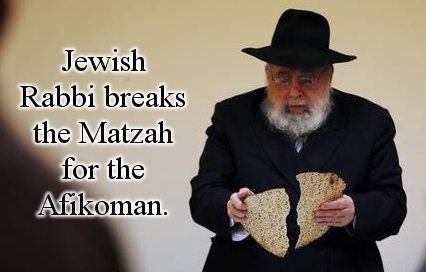 5. Maggid (meaning "teacher") This is a reading of the story of the Jews' exodus from Egypt. 6. Roachtzah (meaning "wash") They wash their hands again, and this time a blessing is said over it. (Prayers: Baruch Ata Ado-nai Elo-heinu Melech Haolam Asher Ki-d’shanu Be-mitzvotav Vetzivanu al Netilat Yadayim. Translates: "Blessed are You, Lord our God, King of the universe, who has sanctified us with His commandments, and commanded us to wash our hands.") 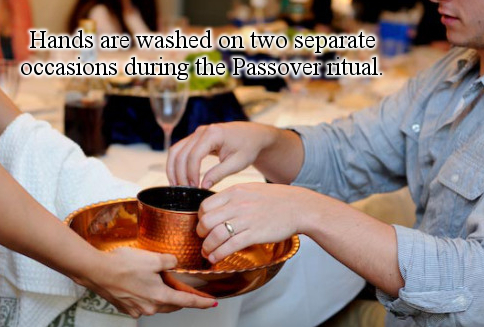 7. Motzi (first blessing) Eating unleavened bread with a blessing. (Prayers: Baruch Ata Ado-nai Elo-heinu Melech Haolam Hamotzi Lechem Min Ha’Aretz. Translates: "Blessed are You, Lord our God, King of the universe, who brings forth bread from the earth.") 8. Matzah (second blessing) Eating unleavened bread again with another blessing. (Prayers: Baruch Ata Ado-nai Elo-heinu Melech Haolam, Asher Ki-d’shanu Be-mitzvotav Vetzivanu al Achilat Matzah. Translates: "Blessed are You, Lord our God, King of the universe, who has sanctified us with His commandments, and commanded us concerning the eating of unleavened bread.") 9. Maror (meaning "bitter") Bitter herbs are eaten and traditionally dipped in Charoset, which is a mixture of apples, nuts, and juice to resemble the clay the Hebrews would make in Egypt. This is a rememberance of the bitter days of slavery, and when bitter herbs are not available, they will sometimes use a bitter dip, like horseradish. (Prayers: Baruch Ata Ado-nai Elo-heinu Melech Haolam Asher Ki-d’shanu Be-mitzvotav Vetzivanu al Achilat Maror. Translates: "Blessed are You, Lord our God, King of the universe, who has sanctified us with His commandments, and commanded us concerning the eating of Maror.") 10. Korech (meaning "wrap") They make a sandwich out of unleavened bread, bitter herbs, and romaine lettuce, representing the brick manufacturing of the Hebrews in Egypt. 11. Shulchan Orech (meaning "set table") The full meal is enjoyed. 12. Tzafun (meaning "hidden") Everyone takes a piece of the Afikoman and eats it. 13. Berach (meaning "bless") They thank God after the meal is eaten. (The Jews did not pray before a meal as traditionally done by Americans; they prayed after the meal.) 14. Hallel (meaning "praise") While drinking an after-dinner cup of grape juice, they sing songs of God's performed miracles. 15. Nirtzah (meaning "accepted") They finish with a solemn prayer to God for the coming Moshiach (Messiah). |
There is a serious problem with a Christian participating in this ritual: the Messiah has already come! When a Christian family participates in this event, it is participating in traditions that were given specifically to the Jew by the Lord God in order to keep sharp in the memory the prophecy of the coming Messiah, but after the Messiah has come, we no longer recognize it, because recognizing it denies the Lord Jesus Christ has come, and puts people in a state of mind to keep looking for Him, as the Jews still do.
Go back and review step #4: This unleavened bread in this tradition represents God sending his own son to live in the flesh, and that's why it is wrapped in linen cloth and hidden, just as Christ was wrapped in linen and buried, and the children are supposed to look for him, meaning that he is returning soon after being killed.
And when Joseph had taken the [Christ's] body,
he wrapped it in a clean linen cloth,
-Matthew 27:59
|
In Jewish tradition, if someone was to get up from the table, the host or hostess would look for their napkin before cleaning their place from the table. If the person left the napkin wadded up on their plate, it was a sign they were finished, but if they folded the napkin and laid it on the table, it was a sign temporary absense, but he/she was coming back. In Scripture, Christ had a napkin about his face when he was put in the tomb:
Then cometh Simon Peter following him, and went into the sepulchre, and seeth the linen clothes lie, And the napkin, that was about his head, not lying with the linen clothes, but wrapped together in a place by itself. |
The large piece of unleavened bread is called the Afikoman, which surprisingly is a Greek word, not a Hebrew word, which is more prophecy of the coming shift from Jew to Gentile. Afikoman means "He has come." This was not always a tradition of the Jews; it used to be that a lamb was consumed, but after the temple was destroyed, they used the Afikoman.
Thus, there are some Christians out there performing these traditions, not as a lesson for children, but instructing them in the ways of the Jews in the Old Testament, which teaches them to look for the coming Messiah, instead of observing the bread and cup of Christ, which is done in rememberance of Christ's coming and sacrifice. Christ called the taking of the bread and the cup together the "passover."
And when the hour was come, he sat down, and the twelve apostles with him. And he said unto them, With desire I have desired to eat this passover with you before I suffer:
-Luke 22:14-15
For I say unto you, I will not any more eat thereof, until it be fulfilled in the kingdom of God. And he took the cup, and gave thanks, and said, Take this, and divide it among yourselves: For I say unto you, I will not drink of the fruit of the vine, until the kingdom of God shall come. And he took bread, and gave thanks, and brake it, and gave unto them, saying, This is my body which is given for you: this do in remembrance of me. Likewise also the cup after supper, saying, This cup is the new testament in my blood, which is shed for you.
-Luke 22:16-20
Wherefore whosoever shall eat this bread, and drink this cup of the Lord, unworthily, shall be guilty of the body and blood of the Lord. But let a man examine himself, and so let him eat of that bread, and drink of that cup.
-1 Corinthians 11:27
Examine yourselves, whether ye be in the faith; prove your own selves. Know ye not your own selves, how that Jesus Christ is in you, except ye be reprobates?
-2 Corinthians 13:5
For he that eateth and drinketh unworthily, eateth and drinketh damnation to himself, not discerning the Lord's body. For this cause many are weak and sickly among you, and many sleep.
-1 Corinthians 11:29-30
So when someone asks you if they should celebrate Passover, as them which passover they're talking about. As for the Old Testament Passover the Jews still observe, we are commanded not to turn back into the old bondage of the law:
But now, after that ye have known God, or rather are known of God, how turn ye again to the weak and beggarly elements, whereunto ye desire again to be in bondage? Ye observe days, and months, and times, and years. I am afraid of you, lest I have bestowed upon you labour in vain.
-Galatians 4:9-11
Stand fast therefore in the liberty wherewith Christ hath made us free, and be not entangled again with the yoke of bondage.
-Galatians 5:1
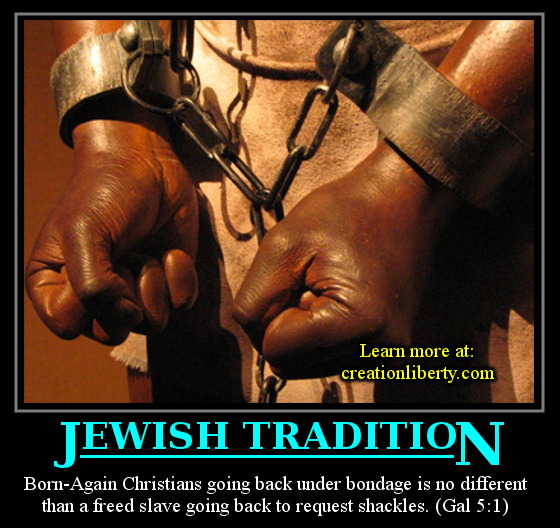
There is nothing wrong with learning about the traditions of the Jews, but to adopt them is a rejection of Christ's finished work on the cross, and worse still, to teach that Christians (especially children) should observe the traditions of bondage is offense to the Gospel.
But whoso shall offend one of these little ones which believe in me, it were better for him that a millstone were hanged about his neck, and that he were drowned in the depth of the sea.
-Matthew 18:6
Making the word of God of none effect through your tradition, which ye have delivered [i.e. taught to the people]: and many such like things do ye.
-Mark 7:13
Beware lest any man spoil you through philosophy and vain deceit, after the tradition of men, after the rudiments of the world, and not after Christ.
-Colossians 2:8











![There is No Saving Grace Without Repentance [creationliberty.com]](../images/store13a.jpg)
![Why Christians Should Study The King James Bible [creationliberty.com]](../images/store15a.png)
![Wolves in Costume: Kent Hovind [creationliberty.com]](../images/store11a.jpg)
![Corruptions of Christianity: Seventh-day Adventism [creationliberty.com]](../images/store09a.png)
![501c3: The Devil's Church [creationliberty.com]](../images/store07a.jpg)
![Feminism: Castrating America [creationliberty.com]](../images/store04a.jpg)



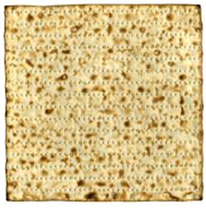







![Why Millions of Believers on Jesus Are Going to Hell [creationliberty.com]](images/store05a.jpg)
![Corruptions of Christianity: Catholicism [creationliberty.com]](http://www.creationliberty.com/images/store14a.jpg)
![False Prophet Profiles: Kim Clement [creationliberty.com]](http://www.creationliberty.com/images/store12a.jpg)
![Christmas: Rejecting Jesus [creationliberty.com]](http://www.creationliberty.com/images/store10a.jpg)
![Christian Music: For The Love of Money [creationliberty.com]](images/store08a.png)
![Psychology: Hoodwinked by the Devil [creationliberty.com]](images/store06a.jpg)
